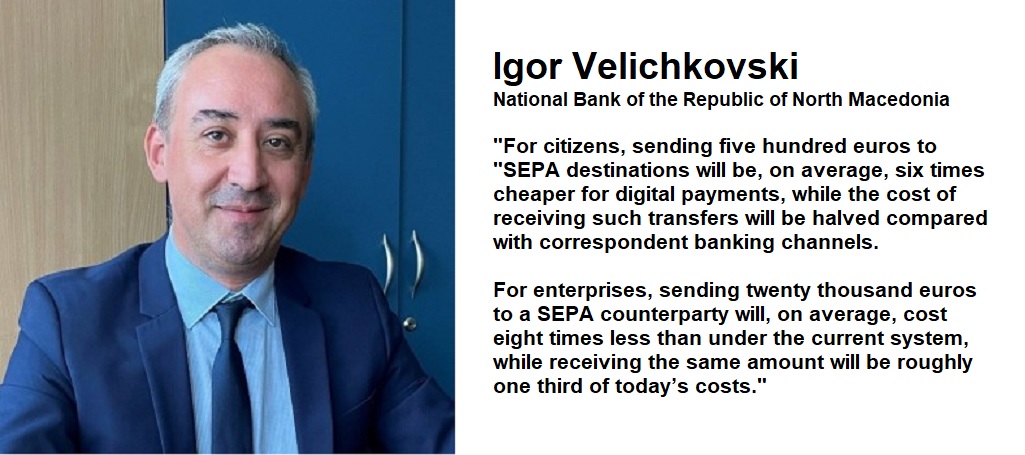
European Payments Council spoke with Igor Velichkovski, Director of the Sector of Financial Market Operations and Payment Systems at the National Bank of the Republic of North Macedonia about the country’s successful journey towards joining the Single Euro Payments Area (SEPA), the transformation of its payment landscape, and the growing influence of digitalisation and innovation.
In March 2025, the EPC approved the inclusion of North Macedonia in SEPA. What advantages do you foresee?
North Macedonia’s accession to SEPA constitutes a landmark in the country’s EU integration trajectory. The advantages are evident in terms of trade and remittance flows. First, the cost and time required for euro-denominated transfers will fall dramatically. Given that ninety-three percent of 2024 cross-border transactions were in euros, SEPA will allow a large share of these to be processed as if domestic.
Second, with seventy-seven percent of North Macedonia’s international trade conducted with SEPA countries, SEPA membership removes structural frictions and strengthens the competitiveness of domestic enterprises. For households and the diaspora, cost savings on personnel transfers and compensation of employees – currently accounting for almost fourteen percent of GDP – translate directly into increased disposable income and improved household welfare.
Third, SEPA integration modernises the country’s financial infrastructure, aligning it fully with EU standards and enhancing resilience. This will benefit banks, non-bank PSPs, and the central bank alike, while simultaneously reinforcing North Macedonia’s strategic orientation towards EU membership.
Have the National Bank of the Republic of North Macedonia or government measured the economic impact of inclusion in SEPA?
The most immediate and tangible benefit lies in the sharp reduction of fees for cross-border euro payments with SEPA counterparts. The nine domestic banks that will become SEPA operational from October have already announced new tariff structures that illustrate the scale of these savings. For citizens, sending five hundred euros to SEPA destinations will be, on average, six times cheaper for digital payments, while the cost of receiving such transfers will be halved compared with correspondent banking channels.
The benefits are even more pronounced for enterprises. Sending twenty thousand euros to a SEPA counterparty will, on average, cost eight times less than under the current system, while receiving the same amount will be roughly one third of today’s costs. Over time, these cost savings will accumulate into significant competitive advantages, boosting trade, facilitating investment, and ultimately supporting stronger economic growth. SEPA thus delivers not only micro-level gains for households and firms but also macroeconomic benefits by improving efficiency across the economy.
How have electronic payment methods – such as mobile payments, e-wallets, and online banking – evolved in North Macedonia, and what impact are they having on consumer behaviour and financial inclusion?
The adoption of electronic payments in North Macedonia has accelerated markedly in recent years. Between 2019 and 2024, electronic credit transfers initiated by citizens doubled, while those initiated via mobile phones expanded fivefold – a clear testament to consumers’ preference for seamless, device-based payment solutions.
This behavioural shift has supported financial inclusion. According to the World Bank’s 2024 Findex Database, eighty-four percent of the adult population held at least one bank account, the highest ratio in the Western Balkans. Nevertheless, challenges remain. Digital literacy gaps and affordability constraints must be addressed to ensure that inclusion is not only widespread but also equitable across demographic groups. SEPA accession is expected to accelerate this momentum, further incentivising the adoption of digital payments and enhancing the inclusivity of the financial system.
The interview in full here
Banking 4.0 – „how was the experience for you”
„To be honest I think that Sinaia, your conference, is much better then Davos.”
Many more interesting quotes in the video below: